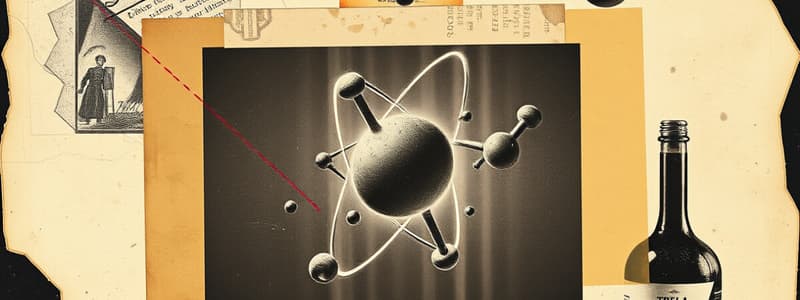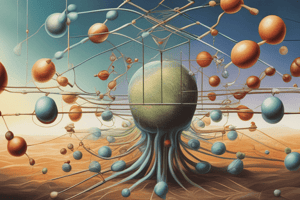Podcast
Questions and Answers
What sub-atomic parts go in the center of the atom?
What sub-atomic parts go in the center of the atom?
Protons and Neutrons
What is the center of the atom called?
What is the center of the atom called?
Nucleus
Which sub-atomic particle determines the element of the atom?
Which sub-atomic particle determines the element of the atom?
Protons
Which sub-atomic particles are considered 'heavy' and which are 'light'?
Which sub-atomic particles are considered 'heavy' and which are 'light'?
What sub-atomic particles are responsible for determining atomic mass?
What sub-atomic particles are responsible for determining atomic mass?
Which sub-atomic particle is responsible for atoms bonding?
Which sub-atomic particle is responsible for atoms bonding?
What is an isotope?
What is an isotope?
What is an ion?
What is an ion?
A sodium ion has 11 protons, how many electrons does a Na- ion have?
A sodium ion has 11 protons, how many electrons does a Na- ion have?
Carbon has 6 protons. How many protons, electrons, and neutrons does Carbon 14 have?
Carbon has 6 protons. How many protons, electrons, and neutrons does Carbon 14 have?
Study Notes
Atomic Structure
- Protons and Neutrons are located in the center of an atom, collectively known as the nucleus.
- The nucleus is the core of the atom, housing protons and neutrons.
Sub-atomic Particles
- Protons are critical for determining the element of the atom.
- Protons and Neutrons are considered "heavy" particles due to their significant mass, while Electrons are "light" with negligible mass.
- Both Protons and Neutrons are influential in determining the atomic mass of an element.
- Electrons play a vital role in the bonding of atoms.
Isotopes and Ions
- An isotope refers to atoms of the same element that differ in the number of neutrons.
- An ion is defined as an atom or molecule that has a net electric charge resulting from the loss or gain of one or more electrons.
Specific Ions and Carbon Isotope
- A sodium ion (Na-) with 11 protons will have 11 electrons, maintaining charge neutrality.
- Carbon, having 6 protons, will also have 6 electrons. In the case of Carbon-14, it contains 6 protons, 6 electrons, and 8 neutrons, due to the additional neutrons contributing to its atomic mass.
Studying That Suits You
Use AI to generate personalized quizzes and flashcards to suit your learning preferences.
Description
Test your knowledge with these flashcards focused on the essential components of atoms. From the structure of the nucleus to the determining factors of an element, these cards cover key concepts in atomic chemistry. Perfect for reinforcing your understanding of atomic theory.




